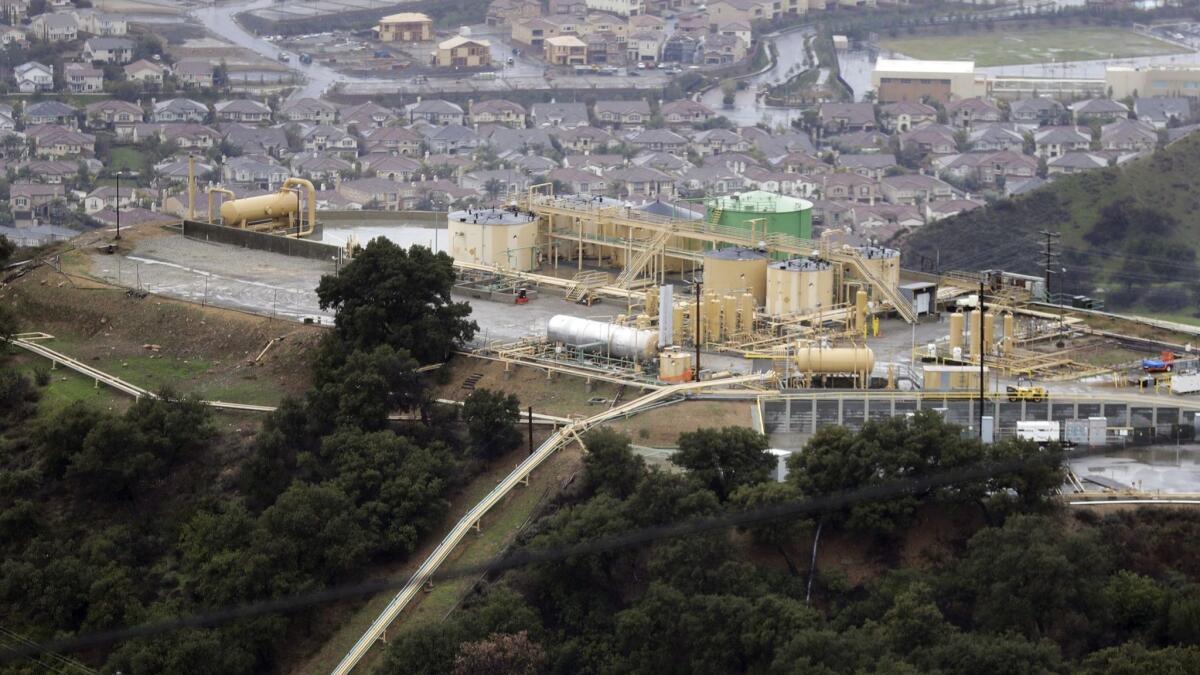Los Angeles firefighters sue Southern California Gas over massive Porter Ranch leak

- Share via
Twenty-nine Los Angeles firefighters who helped Porter Ranch residents after a well blew out in October 2015, resulting in the largest methane leak in U.S. history, filed a lawsuit against Southern California Gas Co. on Monday, saying the utility consciously exposed them to hazardous levels of toxins.
The 56-page complaint, filed in Los Angeles County Superior Court, says exposure to materials such as benzene and formaldehyde — known carcinogens — has caused firefighters to suffer from severe headaches, nosebleeds, skin rashes, dizziness and breathing difficulties. Some firefighters also are battling cancer, according to the complaint.
“SoCalGas chose to lie to us, mislead us and put us in harm’s way without giving us the chance to warn others,” Daniel Mehterian, a recently retired firefighter who is part of the lawsuit, said in a prepared statement. “They robbed us of the chance to help save lives further, and instead chose to hide the truth and cover their own butts.”
Southern California Gas Co. said in a statement Tuesday it is aware of the lawsuit but has not been served with the complaint and “have not yet had the opportunity to review it.”
The utility initially detected the leak Oct. 23, 2015, when a well at an underground natural gas storage facility in Aliso Canyon sent an invisible plume of fumes to nearby homes in Porter Ranch. Residents reported symptoms such as headaches and nausea, and thousands living near the facility evacuated.
At the time, the utility assured the public and firefighters that the gas leak did not pose an “imminent threat” to public safety, so firefighters entered the area without any protective gear, the complaint says.
For nearly four months, firefighters were tasked with helping utility employees, contractors and residents who became sick during the blowout. Representatives from the utility and the Los Angeles County Department of Public Health met with firefighters after they requested air purifiers for their station in December 2015 to assure them the gas was not toxic, according to the complaint.
“SoCalGas engaged in a massive disinformation campaign to understate the risks by telling residents and public agencies: ‘Scientists agree natural gas is not toxic,’ ” the complaint states. “SoCalGas’ assurances were knowingly false or made with a reckless disregard for the truth.”
The firefighters are seeking unspecified damages and attorneys’ fees.
In the months following the discovery of the leak, researchers calculated the well released about 97,100 tons of methane — a greenhouse gas many times more potent than carbon dioxide — as well as 7,300 tons of ethane. The amounts are equal to about a quarter of the methane and more than half of the ethane released in the Los Angeles Basin in an entire year.
The leak already has cost the utility more than $1 billion, an amount that may increase given hundreds of outstanding lawsuits pending against the company, according to recent financial disclosures.
In August, officials announced the utility would pay $119.5 million to settle claims lodged by city, county and state officials that Southern California Gas violated the state’s health and safety laws by failing to promptly control the leak and alert authorities. The money will fund a long-term health study and environmental projects.
Southern California Gas Co. paid $4 million in 2016 to settle separate litigation brought by Los Angeles County prosecutors. The gas company also agreed to an $8.5-million settlement with the South Coast Air Quality Management District over violations during the leak.
Twitter: @Hannahnfry
More to Read
Sign up for Essential California
The most important California stories and recommendations in your inbox every morning.
You may occasionally receive promotional content from the Los Angeles Times.














